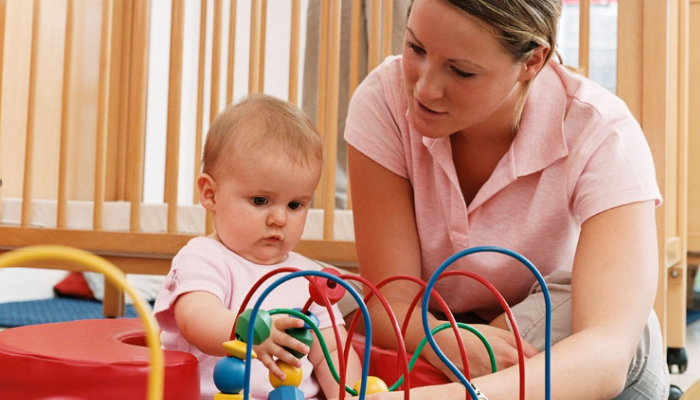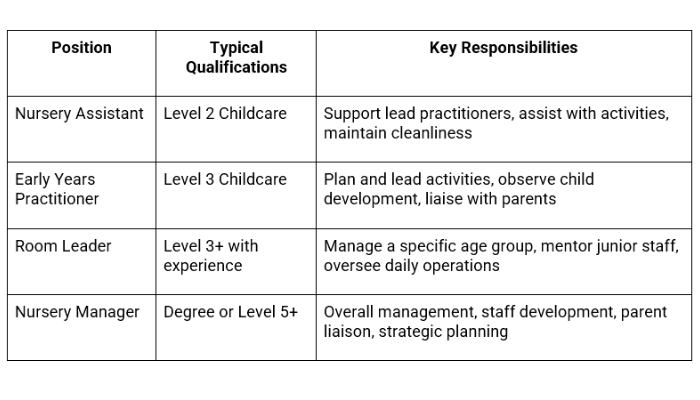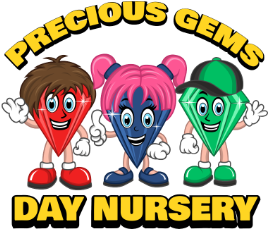How Qualified Are Nursery Staff? Understanding Their Training and Experience

In the realm of childhood education the qualification and background of nursery workers are vital in shaping the minds of children. At Precious Gems Nursery, we emphasise the significance of knowing the skills and knowledge of those looking after our young ones, for parents and guardians. Let’s delve into the realm of nursery staff qualifications and examine why they hold importance.
Introduction
When you drop your child off at a nursery, you’re entrusting their care and early education to a team of professionals. But have you ever wondered just how qualified these individuals are? The qualifications of nursery staff are not just a matter of paperwork – they’re a cornerstone of quality early years education.
The importance of qualified nursery staff cannot be overstated. Research has shown that well-trained early years practitioners can significantly impact a child’s development, setting the stage for future academic success and social well-being. At Precious Gems Nursery, we prioritise staff qualifications because we understand their direct correlation with positive outcomes for children.
The journey to becoming a qualified nursery practitioner is multifaceted, involving a combination of formal education, practical training, and ongoing professional development. This comprehensive approach ensures that those caring for your children are equipped with the knowledge, skills, and experience necessary to provide the best possible care and education.

Basic Qualifications for Nursery Staff
Before we delve into the specifics, let’s establish the foundational requirements for working in a nursery setting.
A. Minimum Educational Requirements
In the UK, the minimum qualification for working in a nursery is typically a Level 2 childcare qualification. However, at Precious Gems Nursery, we often look for staff with Level 3 qualifications or higher to ensure the best care for your children. These qualifications provide a solid grounding in child development, safeguarding, and early years education principles. They equip staff with the fundamental knowledge needed to support children’s growth and learning effectively.
B. Essential Skills and Qualities
Beyond formal qualifications, nursery staff need a unique set of skills and qualities:
- Patience and empathy
- Strong communication skills
- Creativity and enthusiasm
- Ability to work in a team
- Physical stamina
- Keen observation skills
- Adaptability
- Emotional intelligence
- Problem-solving abilities
- Cultural sensitivity
These qualities ensure that nursery staff can create a nurturing, stimulating environment where children feel safe, valued, and encouraged to explore and learn.
C. Legal Requirements
All nursery staff must undergo:
- Enhanced DBS (Disclosure and Barring Service) checks
- Health checks
- Right to work verification
- Safeguarding training
- First aid training (usually paediatric)
- GDPR and data protection training
These measures ensure that all staff at Precious Gems Nursery are suitable to work with children, prioritising safety and well-being. Regular updates to these checks and training sessions are mandatory to maintain compliance with legal requirements.
Types of Nursery Staff Positions
Understanding the different roles within a nursery can help you appreciate the varied levels of expertise present in your child’s learning environment.

At Precious Gems Nursery, we ensure a mix of these roles to provide comprehensive care and education for your children. This hierarchical structure allows for mentoring and knowledge sharing within the team, contributing to a rich learning environment for both staff and children.

Training and Qualifications for Nursery Staff
The landscape of nursery staff qualifications is diverse and continually evolving. Let’s explore the key qualifications that shape the expertise of our team.
A. Early Years Foundation Stage (EYFS) Framework
The EYFS is the statutory framework that sets the standards for learning, development, and care of children from birth to 5 years old in England. All nursery staff must have a solid understanding of this framework.
The EYFS covers seven areas of learning and development:
- Communication and Language
- Physical Development
- Personal, Social and Emotional Development
- Literacy
- Mathematics
- Understanding the World
- Expressive Arts and Design
We ensure all our staff are well-versed in the EYFS, enabling them to provide a balanced and comprehensive learning experience for your child.
B. Level 2 and 3 Childcare Qualifications
These vocational qualifications are the backbone of nursery staff training:
Level 2: Entry-level qualification, equivalent to GCSEs
- Covers basic child development, health and safety, and communication skills
- Typically takes 9-12 months to complete
- Suitable for those starting their career in childcare
Level 3: More advanced, equivalent to A-levels
- Delves deeper into child development theories, curriculum planning, and reflective practice
- Usually takes 1-2 years to complete
- Enables holders to work as qualified practitioners and supervise others
At our nursery, we encourage all our staff to aim for Level 3 qualifications as a minimum. This ensures a high standard of care and education for your children.
C. Degree-level Qualifications
For senior positions, degree-level qualifications are becoming increasingly common:
- BA (Hons) in Early Childhood Studies
- BSc in Child Development
- Foundation Degree in Early Years
- Early Years Teacher Status (EYTS)
These qualifications provide a deeper understanding of child psychology, pedagogical approaches, and leadership in early years settings. They equip staff with the skills to lead teams, develop curricula, and engage in research-informed practice.
D. Specialized Certifications
In addition to core qualifications, nursery staff often hold specialised certifications:
- Paediatric First Aid
- Food Hygiene
- Special Educational Needs Coordinator (SENCO) training
- Safeguarding
- Behaviour Management
- Outdoor Learning
- Makaton or British Sign Language
At Precious Gems Nursery, we ensure all our staff are up-to-date with these crucial certifications. We also encourage staff to pursue additional specialisations based on their interests and the needs of our children.
Continuous Professional Development (CPD)
The learning journey for nursery staff doesn’t end with their initial qualifications. CPD is vital for staying current with best practices and emerging research in early years education.
A. Importance of Ongoing Training
Continuous training ensures that nursery staff:
- Stay updated with the latest educational theories
- Refine their practical skills
- Adapt to changing regulations
- Enhance their career prospects
- Maintain enthusiasm and prevent burnout
- Contribute to the overall quality of the nursery
B. Types of CPD Courses Available
At the nursery, we offer various CPD opportunities:
- In-house workshops
- Online courses
- Attendance at early years conferences
- Peer observation and feedback sessions
- Mentoring programs
- Reflective practice groups
- External training days
- Subscriptions to professional journals and resources
We believe in a blended approach to CPD, combining formal training with informal learning opportunities. This ensures our staff have access to a wide range of developmental experiences.
C. How Nurseries Support Staff Development
Precious Gems Nursery is committed to nurturing our staff’s professional growth. We:
- Allocate time for training during work hours
- Provide financial support for external courses
- Encourage knowledge sharing among staff
- Recognize and reward professional development achievements
- Create individual development plans for each staff member
- Foster a culture of continuous learning and improvement
By investing in our staff’s development, we ensure that your children benefit from the most up-to-date and effective early years practices.

Experience in Nursery Settings
While qualifications are crucial, hands-on experience is equally valuable in the nursery environment.
A. Value of Hands-on Experience
Experience allows nursery staff to:
- Apply theoretical knowledge in real-world situations
- Develop intuition in handling various childcare scenarios
- Build meaningful relationships with children and families
- Contribute to a nurturing nursery culture
- Refine their practice through trial and error
- Adapt to the unique needs of individual children
- Manage unexpected situations confidently
At our nursery, we value the rich insights that experienced practitioners bring to our team.
B. Typical Career Progression
At our nursery, we support career growth. A typical progression might look like this:
- Nursery Assistant (1-2 years)
- Supports qualified staff in day-to-day activities
- Gains foundational experience in childcare routines
- Early Years Practitioner (2-4 years)
- Takes lead in planning and implementing activities
- Begins to form deeper understanding of child development
- Room Leader (4-6 years)
- Manages a specific age group or room
- Develops leadership and mentoring skills
- Deputy Manager (6-8 years)
- Assists in overall nursery management
- Gains experience in administrative tasks and parent communication
- Nursery Manager (8+ years)
- Oversees entire nursery operation
- Focuses on strategic planning and quality improvement
This progression allows staff to gradually take on more responsibility as they gain experience and qualifications.
C. Balancing Qualifications with Practical Experience
We believe in a balanced approach. While we value qualifications, we also recognize the irreplaceable value of experience. Our hiring and promotion decisions always consider both factors.
For example, a practitioner with a Level 3 qualification and several years of experience might be preferred for a Room Leader position over someone with a degree but limited practical experience. Conversely, we might support an experienced but unqualified staff member in obtaining formal qualifications to enhance their practice.
Assessing Nursery Staff Qualifications
As a parent, understanding how to assess nursery staff qualifications can help you make informed decisions about your child’s care.
A. Questions Parents Should Ask
When evaluating a nursery, consider asking:
- What qualifications do your staff hold?
- How do you support ongoing staff training?
- What’s your policy on first aid certification?
- How do you ensure staff are up-to-date with safeguarding procedures?
- What’s the average length of experience among your staff?
- How do you match staff expertise to different age groups?
- What specialised training do your staff have (e.g., SEND, bilingual education)?
At Precious Gems Nursery, we’re always happy to answer these questions and more. We believe in transparency and welcome parent engagement in understanding our staff’s qualifications.
B. Understanding Staff-to-Child Ratios
Staff-to-child ratios are crucial for ensuring quality care. In the UK, the required ratios are:
- 1:3 for children under 2
- 1:4 for 2-year-olds
- 1:8 for 3 to 5-year-olds (1:13 if led by a qualified teacher)
We always adhere to these ratios, often exceeding them to provide even more attentive care. We believe that lower ratios allow for more individualised attention and better learning outcomes for children.
C. Importance of a Mix of Qualifications and Experience
A diverse team brings a wealth of knowledge and skills. At our nursery, we strive for a balance of:
- Newly qualified staff with fresh ideas and up-to-date theoretical knowledge
- Experienced practitioners with proven track records and practical wisdom
- Specialists in areas like SEND or bilingual education
- Staff with varied educational backgrounds (e.g., childcare, education, psychology)
This mix ensures a rich, stimulating environment for your child, where different perspectives and expertise combine to provide comprehensive care and education.
Challenges in Nursery Staff Qualifications
While we strive for excellence, the early years sector faces some challenges in maintaining a highly qualified workforce.
A. Staff Retention Issues
The nursery sector often experiences high turnover due to:
- Low wages compared to other sectors
- Emotional and physical demands of the job
- Limited career progression in smaller settings
- Perception of childcare as a low-status profession
At Precious Gems Nursery, we address these issues through:
- Competitive pay and benefits packages
- Clear career pathways and opportunities for advancement
- A supportive work environment that values staff wellbeing
- Regular recognition and appreciation of staff contributions
- Involvement in decision-making processes
By prioritising staff satisfaction and professional growth, we aim to retain our talented team members, ensuring consistency and quality in your child’s care.
B. Balancing Cost of Training with Nursery Fees
Quality training comes at a cost, which can impact nursery fees. We at Precious Gems Nursery believe in transparency and work hard to balance the need for qualified staff with keeping our services affordable.
Some strategies we employ include:
- Partnering with local colleges for apprenticeship programs
- Utilising online training platforms for cost-effective CPD
- Implementing a ‘train the trainer’ model where senior staff share knowledge
- Seeking government funding and grants for staff training where available
We’re committed to maintaining high standards without passing excessive costs onto parents.
C. Keeping Up with Changing Regulations
The early years sector is subject to frequent regulatory changes. Staying compliant requires ongoing effort and resources. Precious Gems Nursery invests in regular staff training and updates to ensure we’re always at the forefront of best practices.
We tackle this challenge by:
- Maintaining close relationships with local authorities and early years networks
- Subscribing to professional update services
- Designating staff members to monitor and disseminate regulatory changes
- Incorporating regulatory updates into our regular staff meeting agendas
This proactive approach ensures that our practices are always aligned with the latest guidelines and regulations.

The Impact of Qualified Staff on Child Development
The qualifications of nursery staff have a profound impact on children’s development and future prospects.
A. Research on the Benefits of Qualified Nursery Staff
Studies have consistently shown that children cared for by well-qualified staff:
- Develop better language skills
- Have stronger social-emotional competencies
- Are better prepared for formal schooling
A landmark study by the Institute of Education found that the quality of early years provision, heavily influenced by staff qualifications, had effects on children’s development that persisted to age 11.
B. How Staff Qualifications Affect OFSTED Ratings
OFSTED, the regulatory body for early years settings in England, places significant emphasis on staff qualifications in their inspections. Higher qualified staff often correlate with better OFSTED ratings, reflecting the quality of care and education provided.
C. Long-term Effects on Children’s Educational Outcomes
Research indicates that high-quality early years education, delivered by qualified staff, can have lasting effects:
- Improved academic performance throughout school years
- Higher likelihood of pursuing higher education
- Better employment prospects in adulthood
At Precious Gems Nursery, we’re committed to providing this strong foundation for your child’s future.
Future Trends in Nursery Staff Qualifications
The field of early years education is dynamic, with new trends emerging regularly.
A. Emerging Qualifications and Specializations
We’re seeing a rise in specialised qualifications such as:
- Forest School Leadership
- Mindfulness for Early Years
- Digital Literacy in Early Childhood
- Neuroscience in Early Education
Precious Gems Nursery encourages our staff to pursue these cutting-edge specialisations.
B. The Role of Technology in Staff Training
Technology is revolutionising staff training through:
- Virtual Reality simulations for practical skills
- AI-powered personalised learning paths
- Online communities for knowledge sharing
- Micro-learning modules for bite-sized, regular training
We at Precious Gems Nursery embrace these technological advancements to enhance our staff’s skills.
C. Predictions for Future Qualification Requirements
Looking ahead, we anticipate:
- Increased emphasis on degree-level qualifications
- Greater focus on mental health and wellbeing training
- Integration of sustainability and global citizenship in curricula
- More rigorous requirements for ongoing professional development
We are committed to staying ahead of these trends, ensuring our staff are always at the forefront of early years education.
Conclusion
The qualifications and experience of nursery staff are fundamental to providing high-quality early years education. At Precious Gems Nursery, we’re proud of our highly qualified team and their commitment to ongoing professional development.
We encourage all parents to engage with us about our staff qualifications. Your child’s early years are crucial, and understanding the expertise of those caring for them can provide peace of mind and foster a strong partnership between home and nursery.
Remember, when you choose Precious Gems Nursery, you’re not just selecting a childcare provider – you’re investing in your child’s future, supported by a team of dedicated, well-qualified professionals.
FAQs About Nursery Staff Qualifications
Q: What’s the minimum qualification for nursery staff? A: In the UK, the minimum is typically a Level 2 childcare qualification, but at Precious Gems Nursery, we prefer staff to have at least a Level 3 qualification.
Q: How often do nursery staff need to update their training? A: Continuous Professional Development is ongoing. At our nursery, we ensure our staff participate in training sessions throughout the year.
Q: Can someone work in a nursery without formal qualifications? A: While it’s possible to start as an apprentice or trainee, most roles require at least a Level 2 qualification. At our nursery, we support staff in obtaining necessary qualifications.
Q: What’s the difference between a Level 2 and Level 3 qualification? A: Level 2 is an entry-level qualification, while Level 3 is more advanced and allows staff to work in more senior roles. At Precious Gems Nursery, we encourage progression to Level 3 and beyond.
Q: How do nursery staff qualifications in the UK compare to other countries? A: The UK system is well-regarded internationally, with a strong focus on practical skills. Some countries, like Finland, require degree-level qualifications for all staff.
At Precious Gems Nursery, we’re always happy to discuss our staff qualifications in more detail. We believe that transparent communication about our team’s expertise is key to building trust with our families.
